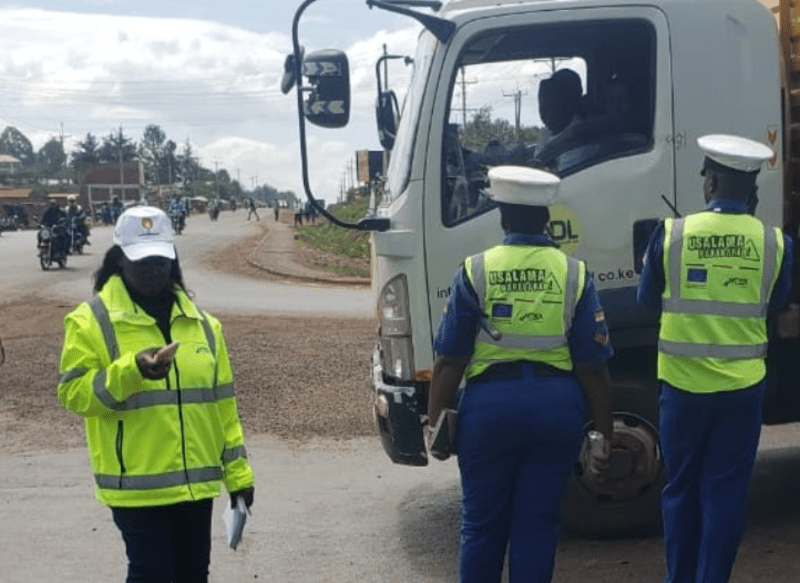NTSA's new rules on commercial vehicles seek to boost road safety

Owners must ensure vehicles are in good mechanical condition and must maintain records of this for at least two years
The National Transport and Safety Authority (NTSA) has introduced new regulations meant to curb road crashes involving commercial vehicles, which have often been in the spotlight over their frequent involvement in accidents.
NTSA describes a commercial vehicle as one built or adapted to carry goods.
More To Read
- Kenya records 80 road crash deaths in four days as government launches safety audits
- MPs fault top state agencies over weak accountability, stalled reforms
- Seven killed in lorry-matatu collision at Korompoi on Isinya-Namanga highway
- New Bill seeks to give NTSA oversight of road, rail, air and maritime crashes
- NTSA urges motorists to pick up unclaimed logbooks
- NTSA rolls out new system for compulsory vehicle records update
The Operation of Commercial Service Vehicle Regulations, 2024 targets vehicles weighing over 3,048 kilogrammes and operating on public roads in Kenya.
The regulations allow NTSA to suspend or revoke licences if holders fail to comply with the laws, with one significant aspect of the new rules being the penalties for non-compliance.
Those operating vehicles in breach of the regulations face fines up to Sh20,000, imprisonment for up to six months, or both. This measure is expected to deter non-compliance and enhance road safety.
To operate legally, operators of commercial vehicles must obtain licences costing Sh2,000, with an additional Sh500 for a road licence per vehicle. The licences must be renewed annually.
The regulations also outline the licensing process, requiring applicants to submit several documents, including a company registration certificate, a Kenya Revenue Authority PIN certificate, and proof of physical address.
The rules also emphasise the responsibilities of commercial vehicle operators, who must ensure their vehicles are always in proper mechanical condition and must maintain records of this for at least two years.
They must also ensure that drivers do not exceed the maximum driving hours as prescribed by the Traffic Act.
In case of an accident that results in a fatality, a preliminary report must be submitted to NTSA within 24 hours.
The report must include the driver’s details, vehicle registration details, maintenance record and the circumstances that led to the accident, if known.
 National Transport and Safety Authority (NTSA) officials and police officers conduct compliance checks along the Kitale-Kapenguri road in May 2024. (Photo: X/NTSA)
National Transport and Safety Authority (NTSA) officials and police officers conduct compliance checks along the Kitale-Kapenguri road in May 2024. (Photo: X/NTSA)National Transport and Safety Authority (NTSA) officials and police officers conduct compliance checks along the Kitale-Kapenguri road in May 2024. (Photo: X/NTSA)
Also, as part of the regulations, all commercial vehicles will be required to have a minimum third-party insurance cover and a valid vehicle inspection certificate.
Another major requirement will be the installation of a speed limiter conforming to the applicable Kenyan standards as stipulated by the Kenya Bureau of Standards.
The vehicles should have an efficient fire extinguisher, which should be well maintained and placed in a way that makes it readily available for use in case of an emergency.
A commercial vehicle should be fitted with a first aid kit capable of dealing with any reasonable emergency.
Under the new regulations, drivers of commercial vehicles also have specific responsibilities.
“A driver of a commercial service vehicle shall conduct pre and post-inspection trips to check for mechanical issues, and safety hazards, ensure compliance of the vehicle with regulations, and immediately report any issue to the owner, carrier or operator of a commercial service vehicle,” the regulations say.
Operators are also required to ensure that their drivers undergo regular road safety training and that the vehicles do not exceed the maximum weight limits.
They must also maintain a log of their driving hours and ensure compliance with all stipulated regulations.
The NTSA believes these comprehensive regulations will play a crucial role in reducing crashes and enhancing safety for all road users.
Top Stories Today
- Education ministry launches forums to address delayed capitation, teacher promotions
- CAF cuts Kasarani crowd to 27,000 after security chaos at Harambee Stars games
- UNICEF urges universal birth registration in Africa to protect children’s rights
- Kenya launches safety audits as 80 road crash deaths recorded in four days
- Britain’s envoy in Nairobi returns home without resolving contentious issues
- CHAN ticket sales suspended at Kasarani following security breach














































